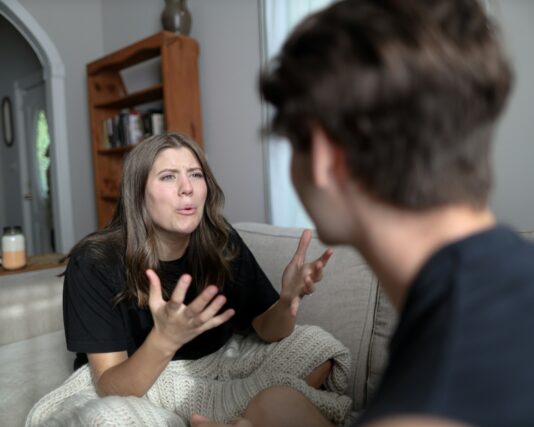When you keep ending up in toxic relationships, it’s easy to blame yourself or wonder if something’s wrong with you.

However, more often than not, it’s about the deeper wiring beneath the surface—how you learned to love, what you were taught to tolerate, and what your nervous system sees as “familiar.” It doesn’t mean you’re broken. It means you’ve got patterns that make chaos feel like connection. Here’s a closer look at why those messy relationships might feel magnetic, even when they hurt.
1. You confuse intensity with intimacy.

If you grew up around big emotions, arguments, or inconsistent affection, healthy love might feel too quiet. You’re used to the highs and lows—it feels exciting, alive. However, intensity isn’t the same as connection. It’s a rush, not a foundation. Real intimacy builds in calm, steady spaces, and if that feels boring or unfamiliar, it’s worth asking why. The answer might explain a lot about your relationship history.
2. You were taught that love has to be earned.

If love in your past came with conditions, like praise for achievement or guilt when you messed up, you might not trust love that feels easy or unconditional. You’re more comfortable proving your worth over and over again. So you gravitate toward people who make you work for it. It feels normal. But being loved without jumping through hoops? That’s the kind of unfamiliar your nervous system really needs to get used to.
3. You mistake emotional chaos for chemistry.

When someone keeps you guessing—hot one day, cold the next—it creates a dopamine loop that your brain reads as attraction. But what feels like romantic tension is often just nervous system dysregulation. That back-and-forth dynamic isn’t chemistry; it’s emotional confusion. The more you chase the “fix,” the more hooked you feel, even if the relationship is unhealthy.
4. You struggle to believe you deserve better.

Deep down, you might not fully believe you’re worthy of being treated with respect, care, and consistency. So when someone offers less, it doesn’t feel off—it feels expected. That belief can be quiet but powerful. It keeps you in relationships where you settle for crumbs because part of you still thinks that’s all you’re allowed to ask for.
5. You feel responsible for other people’s emotions.

If you were raised to smooth things over, keep the peace, or manage adults’ moods, you may now feel drawn to emotionally unstable partners—because fixing feels like love. You end up playing therapist or caretaker, thinking it’s noble. But in reality, it keeps you stuck in cycles where your own needs always come last.
6. You mistake familiarity for safety.

If your early relationships were full of unpredictability or inconsistency, that pattern can feel like home, even if it’s painful. Your brain reads what’s familiar as safe, even when it’s not good for you. That’s how toxic relationships can sneak past your red flags. They don’t always feel “wrong”; they feel like what you’ve always known. That’s why awareness is key to shifting the pattern.
7. You’re used to being over-responsible.

If you’ve always been the one holding things together—at home, at work, in friendships—being with someone who’s chaotic or dependent can feel strangely normal. It gives you a role you know how to play. But relationships aren’t meant to be rescue missions. Being loved for who you are, not for what you can do or fix, is what real partnership looks like.
8. You’re drawn to what feels like a challenge.
 Source: Unsplash
Source: Unsplash When someone is hard to read or emotionally unavailable, it can feel like a game you want to win. If they finally open up, maybe that means you’re special, right? The need for “earning” love turns every relationship into a test. But healthy love doesn’t need to be unlocked. It meets you where you are, no games required.
9. You think boundaries will make people leave.
 Source: Unsplash
Source: Unsplash If setting limits has ever led to rejection or guilt-tripping, you might avoid doing it, even when you need to. You stay silent, tolerate more, and hope it gets better. That lack of boundaries creates the perfect storm for toxic dynamics. Learning to hold your line (even if someone doesn’t like it) is how you stop inviting disrespect.
10. You see red flags, but you rationalise them.
 Source: Unsplash
Source: Unsplash When you want to believe the best in people, it’s easy to overlook the things that make you uncomfortable. You excuse their moods, their behaviour, their lies because you want the relationship to work. But ignoring your gut never ends well. Learning to trust what doesn’t sit right is how you stop choosing partners who turn out to be exactly what you feared.
11. You confuse rescuing someone with being close to them.
 Source: Unsplash
Source: Unsplash You’re the helper, the fixer, the one who “understands.” It feels intimate to hold someone’s mess. But often, that dynamic is one-sided, and leaves you emotionally starved. You deserve reciprocity. If the closeness you feel is only happening when you’re fixing someone, it’s not closeness; it’s emotional labour being mistaken for love.
12. You associate love with emotional highs and lows.
 Source: Unsplash
Source: Unsplash Healthy love feels stable. But when you’re used to emotional rollercoasters, that steadiness can feel flat. You mistake calm for boring because you don’t recognise it as safe yet. It’s normal to crave excitement, but when that excitement comes with constant anxiety, it’s not romance—it’s dysregulation. The goal isn’t “more butterflies.” It’s fewer breakdowns.
13. You feel guilty walking away, even when it’s bad.
 Source: Unsplash
Source: Unsplash You might worry about abandoning someone, hurting them, or being “the bad guy” for leaving. So you stay longer than you should, hoping it’ll improve. Of course, guilt doesn’t mean you’re doing something wrong. Sometimes it just means you’re doing something unfamiliar: choosing yourself. That’s okay, even when it’s hard.
14. You’re afraid of being alone more than being unhappy.

Loneliness is real, and it can cloud your judgement. Sometimes the idea of starting over or sitting with yourself feels scarier than staying in something that drains you. However, peace always beats proximity. Being alone might feel uncomfortable at first, but it’s never as soul-sucking as being with someone who makes you feel small.
15. You believe love should hurt a little.
 Source: Unsplash
Source: Unsplash Whether through movies, family dynamics, or past relationships, you may have internalised the idea that love has to be dramatic. That the struggle is what makes it real. The thing is, love that’s built on suffering isn’t love—it’s survival. And once you experience ease, you realise that healthy love is powerful because it’s peaceful, not in spite of it.
16. You’re used to performing to feel loved.
 Source: Unsplash
Source: Unsplash When love has always felt conditional, you might feel like you have to earn your place in someone’s life by being the most helpful, the most loyal, the most forgiving. That performance keeps you locked in unhealthy dynamics because you’re so busy proving your worth, you don’t notice you’re not being met halfway.
17. You grew up seeing relationships like this.

If toxic dynamics were modelled as normal—whether through manipulation, yelling, or silence—you might not recognise healthy patterns even when they show up. Your blueprint is already wired to expect instability. The good news? Awareness rewrites that script. It takes time, but the more you see the pattern, the easier it is to break it for good.
18. You feel addicted to potential.

You see the good in people. You focus on who they could be if they just healed or tried a little harder. And because of that, you stay, even when their actions don’t match your hope. However, love based on potential isn’t real. It’s an idea. And no matter how hard you try, you can’t be in a relationship with someone’s best-case scenario. Only who they are now.
19. You hope they’ll change if you just love them harder.

This one’s tough. You think if you’re patient enough, kind enough, forgiving enough, they’ll finally show up the way you need. But someone else’s growth is never your responsibility. Loving someone well doesn’t guarantee they’ll meet you there. Sometimes the most loving thing you can do for both of you is to walk away when the pattern doesn’t change.
20. You haven’t seen what healthy love actually looks like yet.

If you’ve never experienced a truly safe, secure relationship, it’s hard to know what to aim for. The bar might be low simply because you’ve never seen it set higher. However, once you get a glimpse of connection that feels grounded, honest, and steady, it becomes hard to unsee. And that’s when your standards naturally rise, not from force, but from finally knowing what’s possible.




